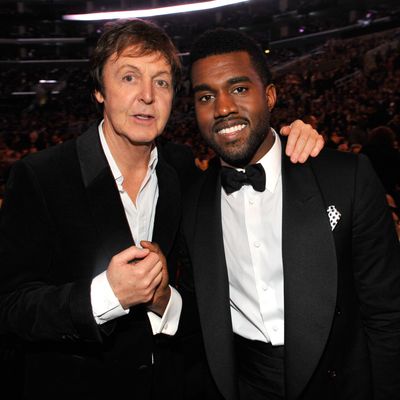
The post–New Year’s unveiling of Kanye West and Paul McCartney’s “Only One” exposed a rift between the rap and rock luminaries’ respective fan bases. Much to the cultural shock of many bystanders, a number of West’s fans greeted the song’s release by earnestly wondering who this McCartney guy was. Others pounced on the confusion. “This Paul McCartney guy,” joked Complex TV satirist Desus Nice on Twitter, “is gonna be huge.” Mocking “These People Who Don’t Know Who Paul McCartney Is” lists and chiding nightly news reports that missed Desus’s irony swiftly followed, triggering a predictable few days of social-media warfare.
In fact, the McCartney snark fit neatly into a recent period of Beatles iconoclasm in the hip-hop community. A few months ago, a social-media gag about the Atlanta trap trio Migos being better than the Liverpool legends led to both ageist bickering and a deeper conversation about the intersection of race and the American music canon. In a year where black youth took to the streets to protest a succession of police shootings of young black men, rejecting the Beatles was a middle finger to the trappings of white American affluence. It’s also a tradition: 40 years ago, the punks sought to build their world on top of the ashes of the rock canon, and then the hip-hop kids scrapped it for parts. Trashing elders’ record collections is a perennial youth pastime.
But that doesn’t mean it’s always right. Rejecting the band as a signifier of old-white-guy American comfort ignores John, Paul, George, and Ringo’s beginnings as working-class youth in a bombed-out British port city. It also fails to account for their politics. The band was publicly against the war in Vietnam in the late ’60s, and even after breaking up, John Lennon nearly got deported for his criticism of the U.S. government, while George Harrison became a powerful advocate and fund-raiser for refugees of Bangladesh’s 1971 war of independence. These are not the comfy capitalists angry millennials are looking for. They used their platform to combat worldwide injustice, and a hip-hop community critical time and again of its stars’ reticence to take challenging stances on social-justice matters could stand to be less dismissive.
Unfortunately, Beatles advocates aren’t exactly helping to bridge the gap, either. News reports presented the “Who Is Paul McCartney?” confusion as whimsical ignorance. The tone was notably uglier on social media. Given an opportunity to introduce the uninitiated to the band’s rich catalogue, most preferred indignation. And the assumption that pillars of middle-aged Caucasian culture are pillars of all the nation’s culture is rooted in dismissive arrogance. Failure to comprehend the existence of an American experience that doesn’t involve the Beatles almost validates the anti-McCartney pushback as a critique of an exclusionary culture. Is it really that weird for younger Kanye fans to be unfamiliar with a man whose band broke up 45 years ago?
Nothing about the “Only One” conversation is particularly inviting to budding young music fans who’ve yet to encounter the Beatles. No one in the know is writing new introductory primers — because, apparently, if you aren’t already aware, you must be an idiot — and few are sharing favorite songs. As is social-media custom, a teachable moment has been lost amid hand-wringing and withering sarcasm. The backlash hasn’t hurt the success of “Only One,” though. The song, reportedly the first fruit of a bigger collaboration, currently sits at No. 35 on Billboard’s Hot 100, a remarkable feat for a lullaby with no bass or drums and patches of unfinished vocals. “Only One” carries all the affecting heart — and provocation — of so much of Kanye West’s best work.
It represents Kanye in another way, too. “Only One” actualizes his ache to expand beyond the confines of hip-hop. The McCartney cosign is a watershed moment for West, who quipped, “What’s a black Beatle, anyway, a fuckin’ roach?” on 2010’s “Gorgeous.” Counting McCartney, who (whether you already knew it or not) has had a hand in multiple pop masterworks, as a friend and collaborator gives West a new level of prestige and influence. Being seen as a worthy songwriting partner for the author of “Can’t Buy Me Love” and “Yesterday” is easily half the boundary-breaking battle here. It’s funny: West spent the better part of a calendar year threatening to gate-crash high society with his last album, 2013’s Yeezus. With “Only One,” the coup has arrived, and it’s surprisingly pretty. Can we at least agree on that?


